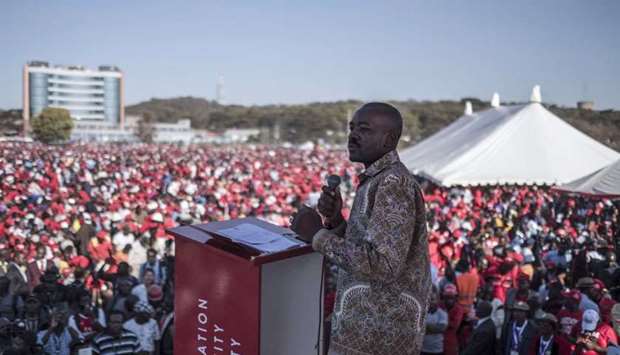Zimbabwe goes to the polls Monday in its first election since authoritarian leader Robert Mugabe was ousted last year, with allegations mounting of voter fraud and predictions of a disputed result.
President Emmerson Mnangagwa, Mugabe's former ally in the ruling ZANU-PF party, faces opposition leader Nelson Chamisa of the MDC (Movement for Democratic Change) in a landmark vote for the southern African nation.
The two rivals held large final rallies in Harare on Saturday in a last push to attract voters, with both predicting certain victory.
Zimbabwe's military generals shocked the world in November when they seized control and ushered Mnangagwa to power, ending Mugabe's 37-year reign in a few short days.
Mnangagwa, 75, who promises a fresh start for the country, is the front-runner with the advantage of covert military support, a loyal state media and a ruling party that controls government resources.
But Chamisa, 40, who has performed strongly on the campaign trail, hopes to tap into a young population that could vote for change as ZANU-PF has ruled since the country's independence from British colonial rule in 1980.
Elections under Mugabe were marred by fraud and violence, and this year's campaign has been dominated by accusations that the vote will be rigged.
The MDC has raised allegations of a flawed electoral roll, ballot paper malpractice, voter intimidation, bias in the Zimbabwe Electoral Commission (ZEC) and free food handed out by the ruling party.
But campaigning has been relatively unrestricted and peaceful compared with previous elections, and some analysts point to pressure for the vote to be judged credible to draw a line under the international isolation of the Mugabe era.
- Violence, or stability? -
‘The international community is looking for an election that will provide sufficient excuse to re-engage with Zimbabwe,’ said Showers Mawowa, an analyst at the Southern African Liaison Office rights advocacy group.
‘There are a lot of political and economic interests at play that are converging around the prioritisation of stability.’
Mawowa said the risk of violence or military intervention could be highest after polling day.
‘There is reason to be anxious about whether or not the military will accept an opposition victory, particularly because they recently executed a de facto coup,’ he said.
‘Post-election violence might be a possibility, with the opposition making it clear that they are not going to accept an outcome that they would have not won.’
Polling in Zimbabwe is uncertain, but a recent Afrobarometer survey of 2,400 people put Mnangagwa on 40 percent and Chamisa on 37 percent, with 20 percent undecided.
Mnangagwa, who is accused of involvement in election violence and fraud under Mugabe, has vowed to hold a fair vote and invited in international observers -- including the previously-banned European Union team.
‘What is left now is only one push on Monday to vote -- to vote for ZANU-PF so we have a thunderous victory,’ Mnangagwa told his supporters who filled about half of the 60,000-capacity national stadium.
‘Today we unlock the potential of our beloved homeland to build a new Zimbabwe for all,’ he said, repeating his promise of economic revival.
Chamisa has launched blistering attacks on Mnangagwa and accused the much-criticised Zimbabwe Electoral Commission (ZEC) of trying to fix the election.
But he has also vowed not to boycott the vote, saying his party would still win.
‘If we miss our opportunity on Monday, we are doomed because the current government is clueless (but) we are the next government, we are the winners no doubt,’ he told a large crowd of more than ten thousand on Saturday.
- An economy in ruins -
The UN High Commission for Human Rights has warned of growing concern over alleged intimidation and threats of violence in the run-up to the election, but said it was encouraging to see open rallies and peaceful demonstrations.
The next government must tackle mass unemployment and an economy shattered by the Mugabe-backed seizure of white-owned farms, the collapse of agriculture, hyperinflation and an investment exodus.
Previously solid health and education services are in ruins and millions have fled abroad to seek work.
Life expectancy has only just recovered to its 1985 level of 61 years.
‘We need to see jobs,’ said Rest Maphosa, one resident of the capital Harare. ‘I will be patient even if it takes me eight hours standing in the queue, because what I want is to vote.’
With 5.6 million registered voters, the results of the presidential, parliamentary and local elections are due by August 4.
A run-off vote is scheduled for September 8 if no presidential candidate wins at least 50 percent in the first round.
Mugabe, now a frail 94, was finally ousted as he tried to position his wife Grace, 53, to be his successor.
In his only press interviews since his fall, he admitted that ‘some errors were done’ under his rule, and said he thought his country was now ‘topsy turvy’.

